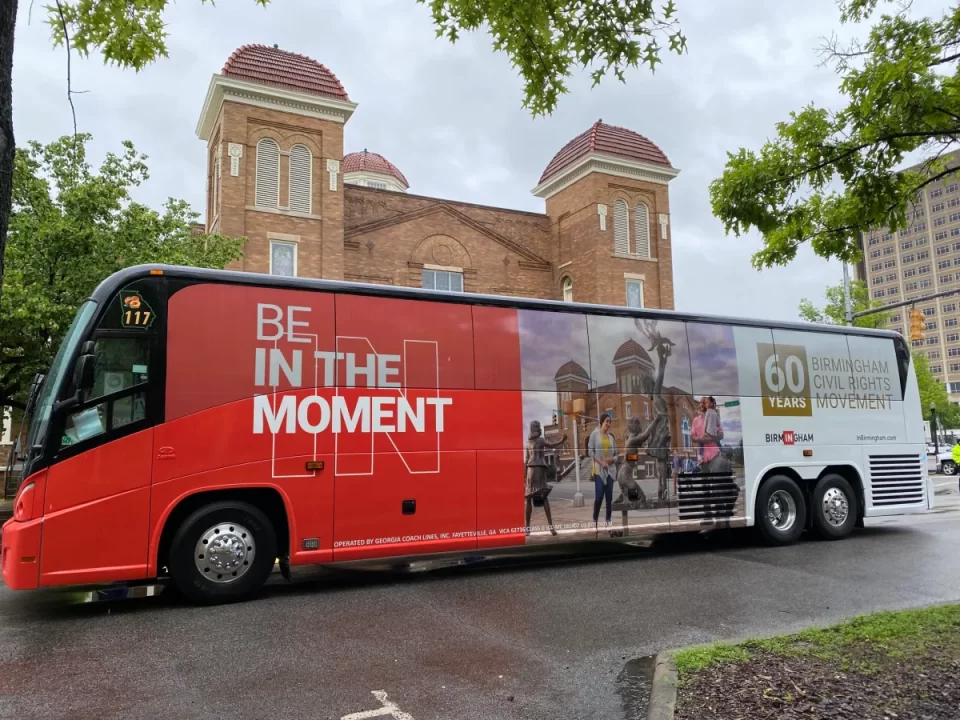Quest for Diversity Is Part of Rights Struggle
Homepage photo: In April, the Greater Birmingham Convention & Visitors Bureau unveiled a new civil rights-branded motorcoach to commemorate the 60th anniversary of the Birmingham Civil Rights Campaign. The bus was unveiled at historic 16th Street Baptist Church, and was to travel the country to inform and educate about the significance of the Civil Rights Movement in Birmingham. (Credit: bhamnow.com)
Support Journal-ismsDonations are tax-deductible.
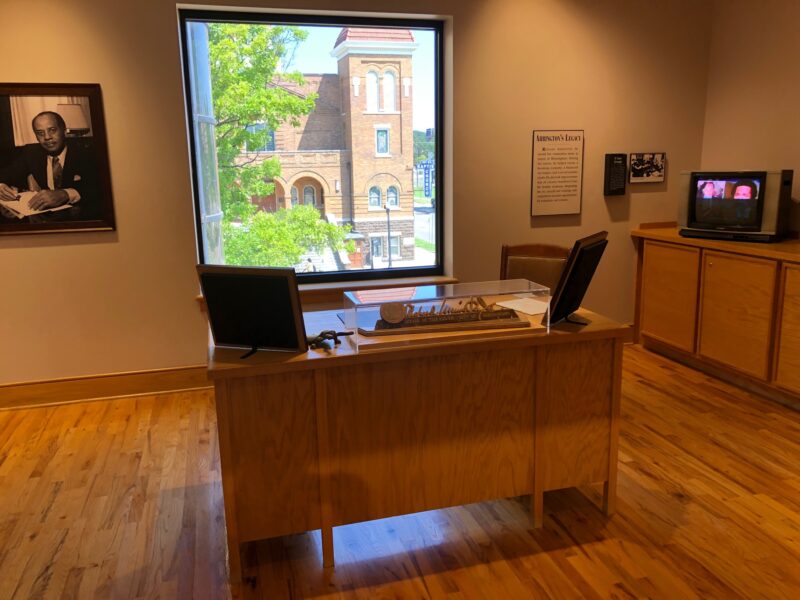
Quest for Diversity Is Part of Rights Struggle
The Birmingham Civil Rights Institute, a museum in the city once known as “Bombingham” that displays artifacts from the civil rights era there, welcomed members of the National Association of Black Journalists on Saturday. One of its displays was a replica of the office of Birmingham’s first Black mayor, Richard Arrington, who served from 1979 to 1999.
Through the window of the replica of the office, visitors could see across the streeet the historic 16th Street Baptist Church, bombed in 1963, famously killing four little girls. Depicted on the television near the mayor’s desk was footage from ABC News reporting Arrington’s groundbreaking election.
The report was anchored by Max Robinson, network television’s first Black anchor and a co-founder of the National Association of Black Journalists.
Outside, tour guide Brenda S. Wright talked about Birmingham’s Black newspapers, the Birmingham World and the Birmingham Mirror, which spread word of the movement when white newspapers did not. Wright implored the journalists, “You’ve got the wisdom to teach these kids. They’re not even listening. They’re on their cell phones.”
Choices of convention sites make a statement, a truism starkly demonstrated by NABJ’s selection of this Alabama city — however belatedly, as some thought it too small and lacking in pizazz — for the 2023 annual gathering.
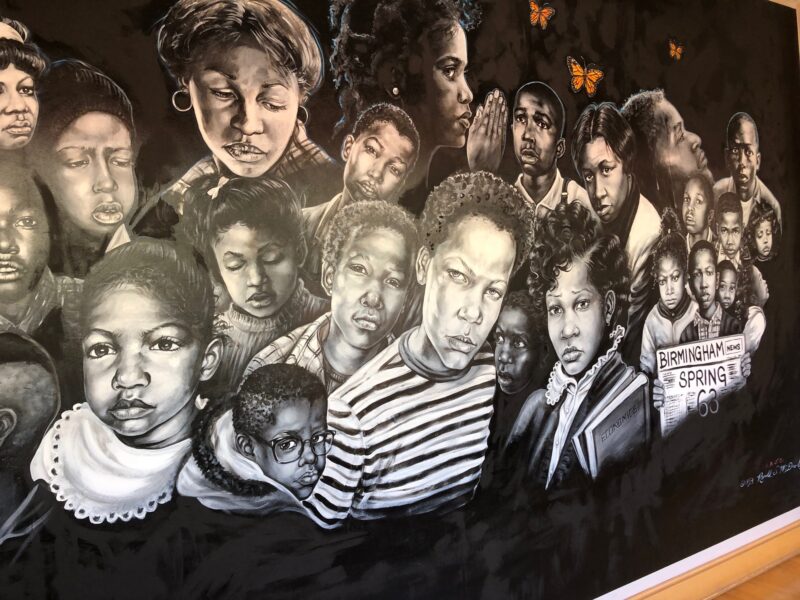
Ten years ago, Paul Cheung was the new president of the Asian American Journalists Association. He visited the NABJ convention then, and told Journal-isms at the time that he found motivation there. “I could really see the civil rights origins” of NABJ, Cheung said. “For AAJA and the other groups, we didn’t come into development” until later. “NABJ led the movement, and to see it was inspiring.”
And so it went Saturday night, when NABJ held its Salute to Excellence Awards Gala in the Sheraton Birmingham Hotel, adjoining the Birmingham-Jefferson Convention Complex in the “Magic City.”
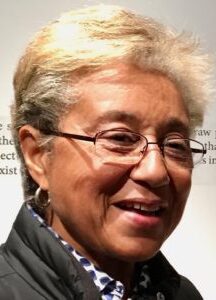 Marquita Pool-Eckert (pictured), the first Black woman in a senior producer position at CBS News, won the Chuck Stone Lifetime Achievement Award. As a young person, she said, she was inspired by the televised news reports about the burgeoning civil rights movement. “I have come full circle in Birmingham,” Pool-Eckert told the crowd, “the place that sparked my interest in television news.” History-making Black journalists Frederick Douglass, Ida B. Wells, Alice Allison Dunnigan, Les Payne, Robert C. Maynard, Chuck Stone and others “each ran their laps and passed the baton.”
Marquita Pool-Eckert (pictured), the first Black woman in a senior producer position at CBS News, won the Chuck Stone Lifetime Achievement Award. As a young person, she said, she was inspired by the televised news reports about the burgeoning civil rights movement. “I have come full circle in Birmingham,” Pool-Eckert told the crowd, “the place that sparked my interest in television news.” History-making Black journalists Frederick Douglass, Ida B. Wells, Alice Allison Dunnigan, Les Payne, Robert C. Maynard, Chuck Stone and others “each ran their laps and passed the baton.”
 Jim Trotter (pictured) of The Athletic, Journalist of the Year, praised many of his mentors and heroes, among them the late broadcast journalist Lee Thornton, journalism professor and White House reporter who demonstrated that “We didn’t get here by ourselves,” and sports columnist Ralph Wiley, who made an impression as “a Black man speaking unapologetically about our Blackness.”
Jim Trotter (pictured) of The Athletic, Journalist of the Year, praised many of his mentors and heroes, among them the late broadcast journalist Lee Thornton, journalism professor and White House reporter who demonstrated that “We didn’t get here by ourselves,” and sports columnist Ralph Wiley, who made an impression as “a Black man speaking unapologetically about our Blackness.”
Trotter, longtime pro football reporter, had publicly challenged NFL commissioner Roger Goodell on the lack of diversity off the field and within the NFL Media Group — where Trotter worked. This year, his contract wasn’t renewed and he signed on with The Athletic..
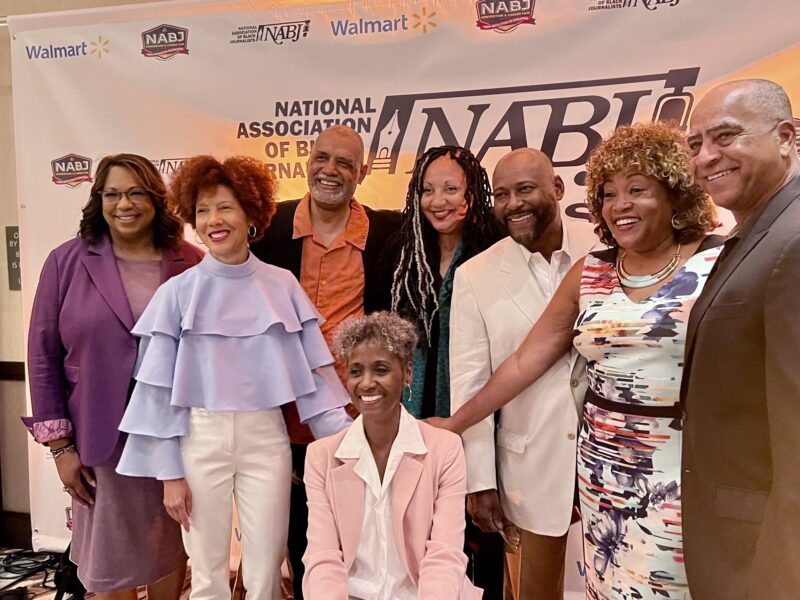
Trotter recalled being assigned to cover Colin Kaepernick after the former San Francisco 49ers quarterback refused to kneel during the national anthem at a 2016 preseason game. Kaepernick was protesting police treatment of people of color, but critics portrayed Kaepernick as unpatriotic and disrespectful.
One voice in Trotter’s head came from the studio, urging Trotter to ask questions about Kaepernick’s alleged disrespect. But another asked Trotter whether he was going to allow someone else to dictate that he would cover Kaepernick “in a negative way.
“Since then, that has been my focus — to give a voice,” not to the voiceless, but “to those whose voices aren’t being heard,” Trotter said. He also became determined to portray people by, in the words of journalist and author David Brooks, their “eulogy virtues,” or “who you are as a person,” rather than by one’s resume.
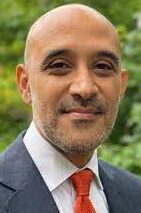 The universality of the quest for civil rights, and diversity in journalism, was exemplified by the choice of British journalist Marcus Ryder (pictured) — a diversity advocate — for the Percy Qoboza Foreign Journalist of the Year Award. Ryder cited figures showing the disproportionately low numbers of journalists of color in Britain, and observed, “We are seeing Black Lives Matter through a white prism.” He accepted the award “on behalf of all the Black journalists who have glass ceilings, but continue to produce amazing work.”
The universality of the quest for civil rights, and diversity in journalism, was exemplified by the choice of British journalist Marcus Ryder (pictured) — a diversity advocate — for the Percy Qoboza Foreign Journalist of the Year Award. Ryder cited figures showing the disproportionately low numbers of journalists of color in Britain, and observed, “We are seeing Black Lives Matter through a white prism.” He accepted the award “on behalf of all the Black journalists who have glass ceilings, but continue to produce amazing work.”
Add to that quest the North Carolina-based Scalawag, winner of the “Best Practices” award. Cierra Hinton, executive director and publisher, described the magazine as “Black-led and Black-centered, always and forever Southern, Black and queer and abolitionist, and so am I.” Her website says, “More often than not, media is used to sustain white supremacy and racism, classism, patriarchy, homophobia and transphobia, and xenophobia. Scalawag is here to prove that it can be used to dismantle systemic oppression and redistribute power too.” (There was no “Thumbs Down” award this year.)
Outgoing NABJ President Dorothy Tucker bestowed her final President’s Award on Paula Madison, CEO of Madison Media Management and former NBCUniversal executive, longtime NABJ member and insider.
Madison said she was starting her own news leadership program and had invited fellow broadcast journalists to gather other Black news directors to meet. The number started small, but grew to 15 by the time of their scheduled session, and included three assistant news directors.
Madison told the group that their numbers must grow, and said that would happen not because Madison would mentor them, but because “you will be mentoring each other.
“If y’all aren’t fed up because of where we are right now, then you shouldn’t be here,” she told the audience, adding expletives for effect.
Tucker, honored as she closed out two terms as president, reiterated, “What we do matters. As journalists, we ought to be fighting for stories that tell the stories about Black America,” a sentiment seconded by her successor, broadcast journalist Ken Lemon. Until Sunday he was vice president/broadcast. “You can’t slow down,” Lemon said. “NABJ stand — I will stand with you.”
Watching it all was Kevin McIntyre, a Black engineer whose wife, Washington Post personal finance columnist Michelle Singletary, was given the Legacy Award at a Friday ceremony.
McIntyre called the ceremony “eye opening and inspiring.” He said the array of winning entries in the Salute to Excellence contest inspired him to read or view the winners. As journalists are witnesses to history, he said, “I want their perspective — to see it through the eyes of someone who looks like me.”
One winning entry stood out, he said. It was by Barnett Wright of the Birmingham Times, in the “Newspaper” category, staff of 50 and below: “ ‘Fifth Little Girl’ in Birmingham Church Bombing and Her Nurse at Hospital Reunite — After 6 Decades.”
Full circle, as Pool-Eckert said.
- Deborah D. Douglas, Moon.com: U.S. Civil Rights Trail: A Traveler’s Guide to the People, Places, and Events that Made the Movement (book) (January 2021)
- Jaime C. Harris, New York Amsterdam News: Rob Parker, pioneering sports journalist, to be inducted into the NABJ Hall of Fame
- National Association of Black Journalists: NABJ Announces 2023 Salute to Excellence Nominees (May 22)
- Elijah Pittman, NABJ Monitor: NABJ and NAHJ Divorce: What Happened?
- Samuel Robinson, Axios: Why They Left: Detroiters at NABJ in Birmingham
- WBRC-TV, Birmingham, Ala.: National Association of Black Journalists Hosts annual convention in the Magic City, massive economic impact expected
- NABJ Monitor coverage
Lemon Defeats Anderson for NABJ President
Aug. 5, 2023
Transgender Candidate Wanted Higher Turnout
Texas A&M to Give McElroy $1 Million
Homepage photo: Ken Lemon after winning the vote for NABJ president (Credit: Richard Prince)
Support Journal-ismsDonations are tax-deductible.
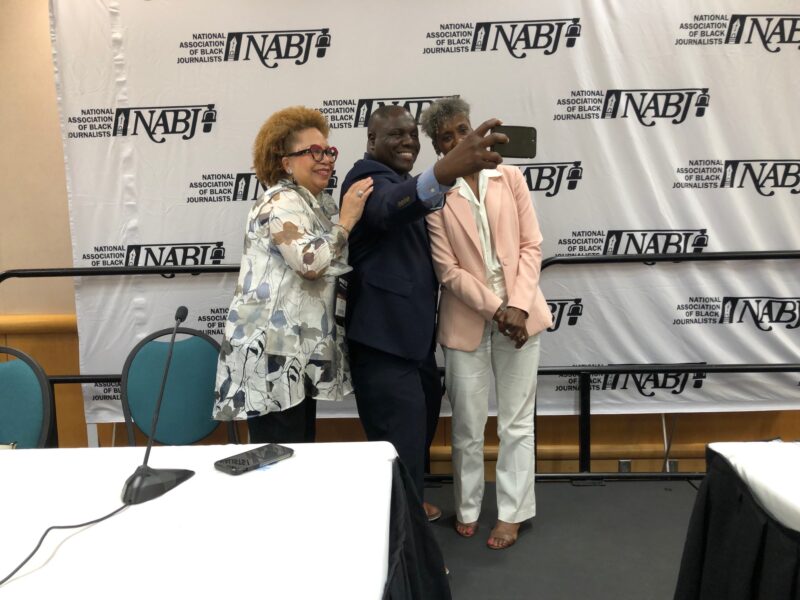
Transgender Candidate Wanted Higher Turnout
Ken Lemon, a reporter for WSOC-TV in Charlotte, N.C., and vice president/broadcast of the National Association of Black Journalists, Friday defeated Tre’Vell Anderson, the first transgender candidate for NABJ president. In unofficial returns, Lemon garnered 467 votes, or 66 percent of the total, to 236 for Anderson, or 34 percent.
“I won because I heard what people wanted for the organization,” Lemon told Journal-isms after the announcement, made at the NABJ convention in the Birmingham-Jefferson Convention Complex in Alabama.
“This is a chance to do that,” to be an organization that is “ready to stand up against the fight against diversity and inclusion,” and to fight what members considered “George Floyd fatigue,” a reference to weariness by some of was called a racial reckoning in the media industry and elsewhere after the 2020 police killing of Floyd in Minneapolis.
Anderson, a podcast host, self-described “independent journalist and authoress,” second-term NABJ regional director and co-chair of NABJ’s LGBTQ+ Task Force, told Journal-isms, “When you support the most marginalized, you make things better for everyone else. Not enough people believed in that, and that’s OK.
“Now it’s up to the rest of us. I’m going to keep on doing what I’m doing,” said Anderson, who plans to continue as an NABJ board member. Anderson bemoaned what the candidate considered the insufficient number of people who voted, about 700 of a membership of about 3,000, though not all of them are eligible to vote.
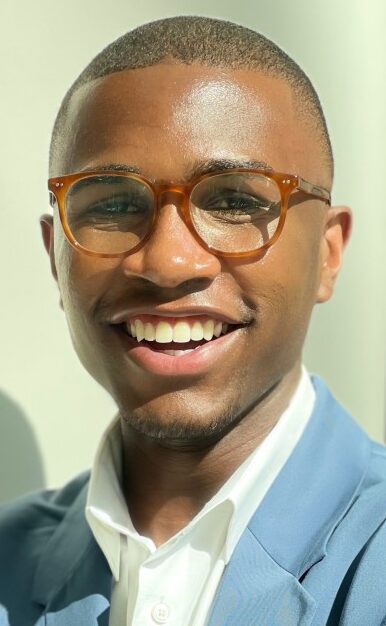 In the contest for student representative, Grant Hines (pictured), “a graduate of High Point University and up-and-coming reporter,” according to his bio, received the most votes in the unofficial total.
In the contest for student representative, Grant Hines (pictured), “a graduate of High Point University and up-and-coming reporter,” according to his bio, received the most votes in the unofficial total.
Hines narrowly defeated Alex Perry, editor-in-chief of The Daily Northwestern, a part-time copy editor at Axios and a reporting intern at The Information in New York on the venture capital beat; and Anthony Council, a junior at the University of North Texas studying broadcast media. The tallies were Hines, 31 votes, or 37 percent; Perry, 29 votes or 35 percent; and Council, 24 votes, or 29 percent.
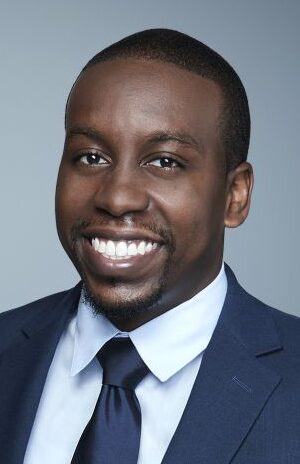 For vice president/digital, Amir Vera (pictured), a Los Angeles-based breaking news editor for CNN Digital and past president of the Atlanta Association of Black Journalists, defeated Vance Lang, a director for CBS News Streaming and production manager for the “CBS Sunday Evening News.” Vera received 448 votes, or 69 percent, to 206, or 31 percent, for Lang.
For vice president/digital, Amir Vera (pictured), a Los Angeles-based breaking news editor for CNN Digital and past president of the Atlanta Association of Black Journalists, defeated Vance Lang, a director for CBS News Streaming and production manager for the “CBS Sunday Evening News.” Vera received 448 votes, or 69 percent, to 206, or 31 percent, for Lang.
Three other candidates — Eva Coleman as Region III director, Madison Carter as secretary and Walter Smith- Randoph as vice president/broadcast, were unopposed.
All constitutional amendments passed. They were intended to clarify what constitutes a quorum at a business meeting (561 votes yes, or 83 percent) and what justifies suspending a member from NABJ (573 votes yes, or 83 percent).
They state that members receive no salary (599 votes yes, or 88 percent) and that, according to an NABJ summary, “Emerging Professional Members, members with less than five years experience in journalism, will be eligible to serve on the NABJ Board but not the NABJ Executive Board Committee i.e. President, VP Broadcast, VP Print, VP Digital, Secretary, Treasurer and Parliamentarian. Previously, Emerging Professional members were not eligible for any board position.”
Lemon headed NABJ’s Black Male Media Project, “created to promote broader and more accurate depictions of Black men in their communities, society and the media.”
He said in his campaign statement, “I have experience working with NABJ on a local, regional and national level and a history of working with and fighting for journalists. I will bring those principles to my work for you as NABJ President. That includes long-term plans to produce more Black news leaders, strengthen finances to better serve members, connect with local chapters, and bring more access to your Board of Directors.
“My plans work best when they include active input and engagement from members. That builds inclusion and creates continuity. I look forward to working with you to build a better NABJ.”
After the announcement of the voting results, Lemon reiterated his love for the organization and thanked outgoing president Dorothy Tucker, among others, saying about Tucker’s presidency, “the last four years have let me mature in ways I could not explain.” He concluded by urging, “Let us lock hands to do the impossible.”
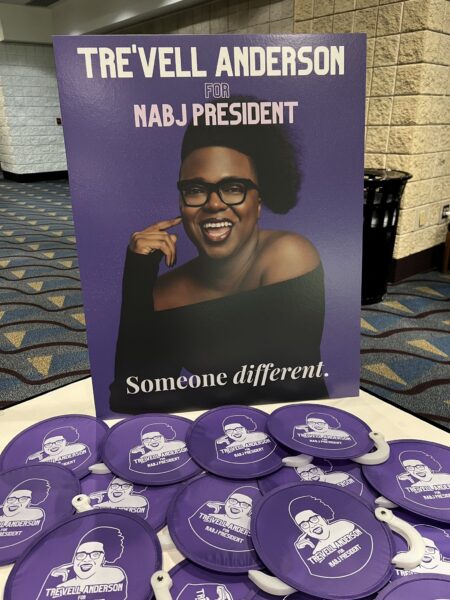
At a convention candidates forum, Anderson advocated re-energizing the membership and for NABJ to produce a count of how many Black journalists exist in the country, among other ideas. “I’ve heard people say we need to do something different,” Anderson told the group.
But Anderson, founder and chief imagination officer of Slayzhon, a social curation and media production house, also said after the vote tally, “I had many people tell me that they felt like I was so focused on the LGBT (issues)” even when Anderson had not mentioned them, that they were “concerned about whether I could be a president for everyone.”
Lemon did not focus on the LGBT issue. He told Journal-isms that he had supported Anderson in the past and displayed a photo they took together. If Anderson’s being transgender was a problem for people, Lemon said, “they need to check themselves.”
- National Association of Black Journalists: Ken Lemon Elected NABJ’s 23rd President During National Convention
- Deon Osborne, Black Wall Street Times: Byron Donalds dodges Nikole Hannah-Jones, Black history Panel
- Elijah Pittman and Cassandra Dumay, NABJ Monitor: Lemon elected as 23rd president of NABJ
Texas A&M to Give McElroy $1 Million
Report Bares Opposition by Conservative Regents
Support Journal-ismsDonations are tax-deductible.
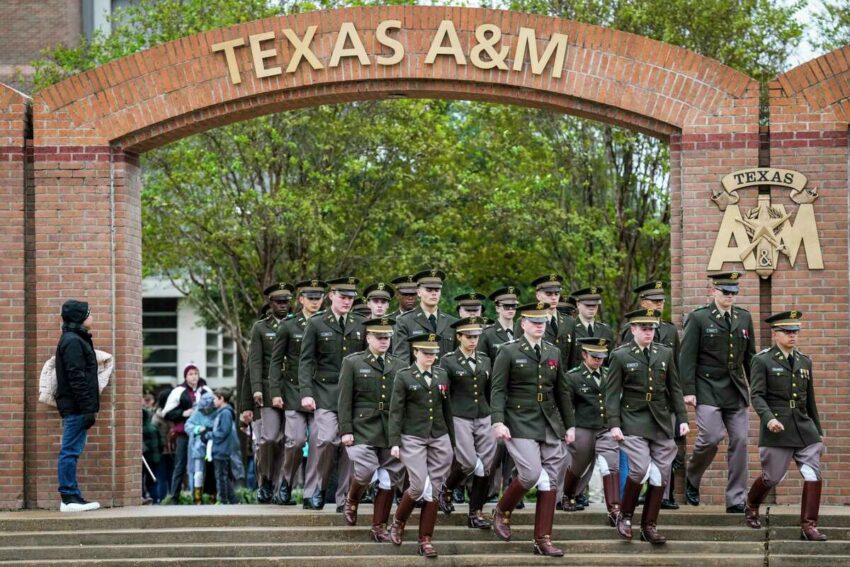
Texas A&M University Corps of Cadets march to Veterans Review last November in College Station, Texas. (Credit: Brett Coomer/Houston Chronicle)
Report Bares Opposition by Conservative Regents
“Texas A&M University reached a $1 million settlement with a Black journalism professor who said her tenured position offer fell apart after backlash to her work on diversity and equity efforts, the university announced Thursday,” Joe Sutton and Andy Rose reported Friday for CNN.
“The university’s leadership apologized to Kathleen McElroy for ‘the way her employment application was handled’ in June when the terms of her proposed contract changed dramatically.”
The settlement followed an internal report Thursday with additional revelations.
Kate McGee wrote for The Texas Tribune, “Several high-level Texas A&M University System officials — including the board of regents and the flagship campus’ president — were involved in discussions about how to handle [McElroy’s] job offer after conservatives criticized her hiring. . . .
“The details of the report contradict former Texas A&M University President M. Katherine Banks’ earlier claims that she was unaware that the school had watered down its offer to Kathleen O. McElroy after the pushback. Banks abruptly retired last month amid turmoil spurred by the botched hiring.
“The report also confirms the unusual involvement of system-level regents, who are gubernatorial appointees, in a university-level hire. And the report confirms that university leadership tried to delay the announcement of McElroy’s hiring until after this year’s legislative session ended. . . .
“Text messages and emails included in the report Thursday show that some of the system board members wanted the new journalism program to ‘get high-quality Aggie journalist[s] with conservative values into the market,’ according to a text message between regents Jay Graham and David Bagget.
“The effort to promote conservative values at A&M extended beyond the journalism program, according to texts between Graham and Bagget.
“Kathy [Banks] told us multiple times the reason we were going to combine arts and sciences together was to control the liberal nature that those professors brought to campus,” Graham wrote. ‘This won’t happen with this kind of hire.’ . . .
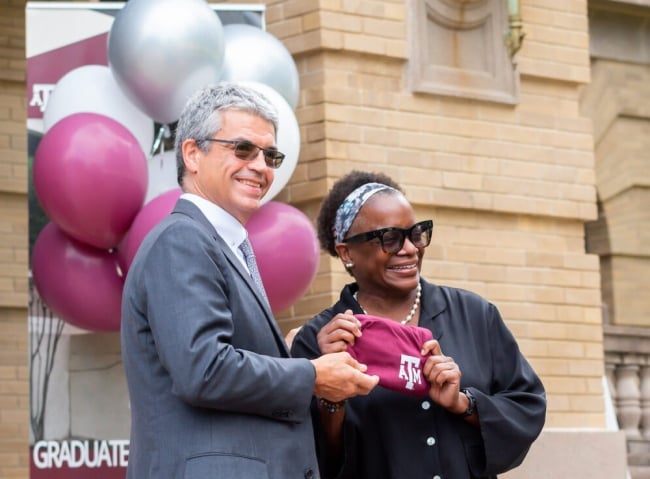
In the Houston Chronicle, Samantha Ketterer noted that a “June 15 article in Texas Scorecard, a conservative-affiliated publication, changed the course of the hiring. The article labeled her a ‘DEI proponent,’ generating a number of calls and emails to the president’s office, including from The Rudder Association. About six or seven members of A&M System’s Board of Regents also called Banks and raised concerns, which stemmed from a recent statewide ban on DEI offices at universities.
“The regents questioned how McElroy’s ‘advocacy for DEI could be reconciled’ with the system’s obligations that they annually certify that they were following state law surrounding anti-DEI measures, according to the report.”
As noted by McGee in The Texas Tribune, “Under a new law taking effect Jan. 1, Texas legislators have banned diversity, equity and inclusion offices, programs and training at publicly funded universities.
“McElroy, a 1981 Texas A&M graduate, has studied news media and race, with a focus on how to improve diversity and inclusion in newsrooms. She previously said that her appointment was caught up in ‘DEI hysteria’ as Texas university leaders try to figure out what type of work involving race is allowed under the new law. She told the Tribune she felt judged for her race and gender and said an A&M administrator told her that her hire has raised concerns within the system because ‘you’re a Black woman who worked at The New York Times.’ “
McElroy messaged Journal-isms Friday, “This matter has been resolved. But I wish I could bottle the encouragement I received from organizations, government officials, friends and strangers, and distribute that support to the rest of the world. I will remember every resolution, public statement, commentary and friendly email or text.
“However I know others deserve similar attention — from Wall Street Journal reporter Evan Gershkovich, still detained in Russia, to the everyday people who quietly bear the brunt of oppressive policies and practices. I’m moving forward. I’m excited about projects I have resumed at the University of Texas at Austin, including work in ethical leadership in media as well as supporting community journalism. My career continues as does my commitment to journalism, higher education and trying to do the right thing.”
McElroy said she did not know what she would do with the $1 million.
Meanwhile, Nikole Hannah-Jones, whose experience in 2021 at the University of North Carolina was similar to McElroy’s in Texas, is at the convention of the National Association of Black Journalists in Birmingham, Ala.
She is promoting the Center for Journalism & Democracy, which she helped create at Howard University after turning down UNC, and the Ida B. Wells Society for Investigative Journalism, now based at Morehouse College. She also appeared on a panel, “Journalism in the Age of Political Extremism: Black Women on the Front Lines.”
Hannah-Jones introduced the society’s new director, Robbie Morganfield, Ph.D., at a reception Thursday, and at the center’s table at the career fair, promoted the Center’s “Democracy Summit” Nov. 14, at which “journalists, historians and democracy experts will gather to unpack threats to American democracy and examine how our media can protect it.”
- Office of General Counsel, Texas A&M University System: Report on Review of Failed Hiring Process at Texas A&M University Relating to Dr. Kathleen McElroy [PDF]
NAHJ Said to Sign Conflicting Contracts
August 3, 2023
‘We Won’t Be Left Holding the Bag,’ NABJ Says
Chicano Author, Journalist Roberto Rodriguez, 69
Mark Jackson Laid Off at ESPN
Donations are tax-deductible.
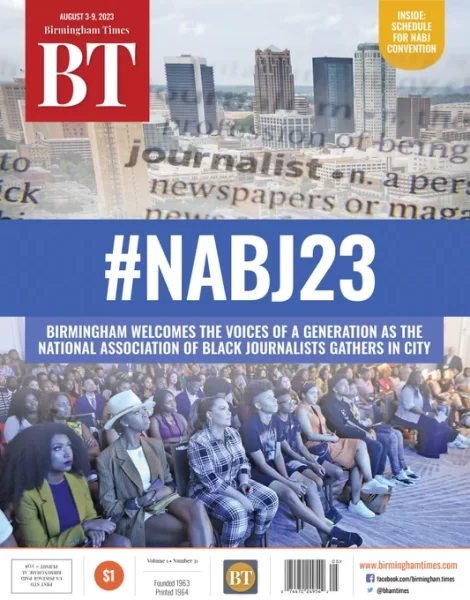
‘We Won’t Be Left Holding the Bag,’ NABJ Says
The National Association of Hispanic Journalists signed a contract to locate its 2024 convention in Hollywood, Calif., even though an NAHJ agreement with a Chicago venue for 2024 was still in force, Drew Berry, executive director of the National Association of Black Journalists, said Wednesday.
That would mean the Hispanic group increased its financial liability by pulling out of its planned joint conference with NABJ during the presidential election year so it could commemorate its 40th anniversary in Hollywood without NABJ.
Berry was speaking at the annual business meeting at NABJ’s annual conference, held this year in Birmingham, Ala. He said 3,297 people had registered to date, its highest number since 2019, when its Miami gathering drew 4,105. Berry’s comments about the 2024 convention were the most expansive on the record from either organization. He called the situation “frustrating.”
When NAHJ President Yvette Cabrera was pressed on the financial cost of the pullout at NAHJ’s business meeting last month, Cabrera repeatedly deflected the question, saying “it’s a contract issue.” (video)
At the same time, Berry, questioned separately about the financial implications, pointed to the two groups’ sunny news release, saying, “The statement is all we have to say.”
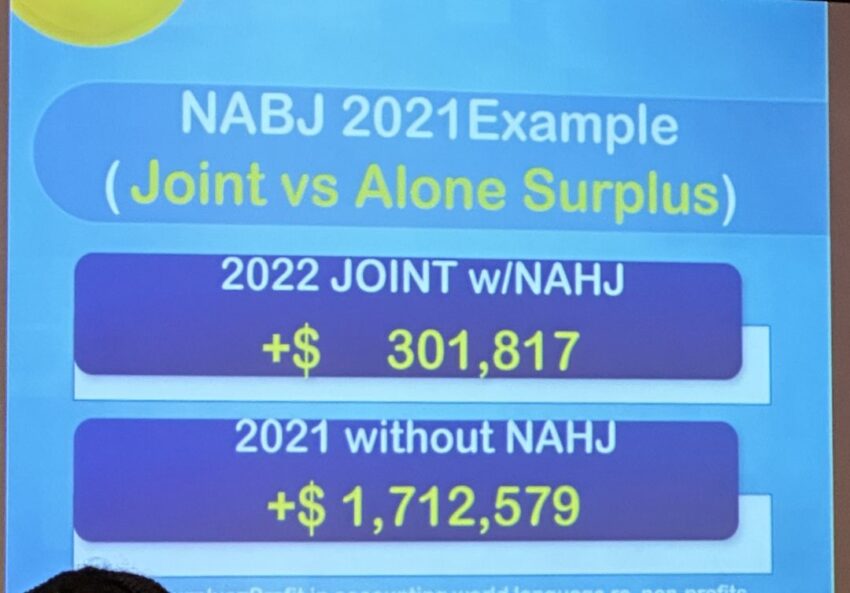
The tone at the NABJ business meeting Wednesday, held at a hotel adjoining the Birmingham-Jefferson Convention Complex, was markedly different. Seeking to appear transparent and fiscally prudent, Berry said he was limited in what he could say, but brought a number of visual aids that sought to show the financial pros and cons of partnering with NAHJ. Berry said that NABJ does better financially when it eschews joint conventions and goes it alone, and said of NAHJ, “They can benefit by being with us.”
At the 2022 joint convention in Las Vegas, for example, NABJ made $301,817. But in 2021, without NAHJ, NABJ made $1,712,579. Moreover, holding the convention in Chicago raises labor costs because of union requirements. “We wouldn’t have gone there by ourselves,” Berry said, pointing to NABJ’s choice of less-expensive Birmingham for its own convention this year. “We have avoided high-cost union cities. We do very well alone.”
Berry said there are still “cordial negotiations between all parties” and that Cabrera is “very much involved.”
Financial considerations aren’t the only ones, of course. The prospect of the two groups questioning candidates jointly during a presidential campaign and the goodwill earned among fellow journalists of color also play roles.
But finances remain central. The issue of the financial split between journalists of color associations helped end the Unity: Journalists if Color, later Unity: Journalists for Diversity, coalition.
Should the revenue be split equally, be based on who brings how much to the table, or some other measurement?
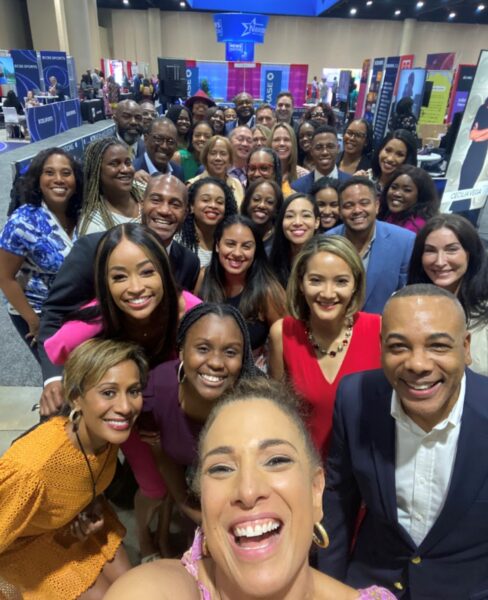
When former NAHJ Executive Director Alberto B. Mendoza helped arrange plans for the 2024 joint meeting, Berry said he knew that concerns over the split of the money might surface over time, as each organization monitors changes in how much money it raises.
Mendoza left in 2021 for the John S. Knight Journalism Fellowships at Stanford, and in February 2022, David Peña Jr. was named to replace him. Peña “expressed a desire for celebrating its 40th anniversary alone,” Berry said, but Berry told Journal-isms he responded, “we won’t be left holding the bag.” He would not elaborate. Twelve days before the NAHJ convention, Peña resigned as NAHJ executive director. Others at NAHJ left as well.
Most NAHJ members found out about the pullout from Chicago from news reports and an announcement at the back of the convention program booklet touting the presence of the 2024 event in Hollywood, Calif.
It was originally set for May, but sponsors are said to have balked because of the unplanned expense that would incur for that budgetary year, and now the Hollywood event is scheduled for July 9-13, 2024.
Cabrera messaged Journal-isms on Thursday, “If any financial issues arise from the decision not to hold a joint conference in 2024, both organizations will work together to resolve them. We look forward to working together in the future.”
[Update: Later Thursday, Cabrera wrote in a message to NAHJ members, “As to any statements indicating that there is financial liability as a result of the organizations’ mutual decision, we are optimistic this matter will be resolved without cost for either organization, as the Chicago Hilton has already offered to amend the 2024 contract and right-size the event to align with NABJ’s needs as they were back in 2019 when it first announced its decision to go to Chicago and signed the hotel contract.
[“However, to the extent there may be any additional financial liability as a result of the change, NAHJ remains prepared to address and to resolve any such liability with the Hilton.”]
Adrian Carrasquillo wrote July 17, updated July 18, in The Messenger, “Multiple sources familiar with NAHJ’s deliberations told The Messenger the real issue at play was that during the 2022 joint conference in Las Vegas, NABJ commanded a 70% to 30% profit split with NAHJ, while the Hispanic journalists group was still forced to pay for half of the production costs for the sprawling multi-day event in Caesar’s Palace.”
Berry told the opening session that the Birmingham convention drew 3,297 registrants to that point. This year, the Hispanic journalists group counted 1,550 registrations, according to preliminary figures. At NABJ’s Tuesday board of directors meeting, Berry said, “[In ] 2021, NABJ had 4.4 million in revenue; in the same year, NAHJ had about half of that,” Elijah Pittman reported for the NABJ Monitor, the student convention project. “We’re strong; we’re very strong.”
Berry said NABJ attracted 113 companies doing business with the organization, 92 of which were at the career fair. The association had awarded $436,000 in fellowships and $43,000 in hardship grants, and more specifically for the Black press. There are more than 200 conference sessions, he said, with a “heavy emphasis” on artificial intelligence.
The Birmingham conference included seven free breakfast or lunch sessions and 17 network receptions, he said.
Unlike in Las Vegas, where NABJ and NAHJ held a joint convention last year, and in other cities where large conventions are routine, Birmingham publicly showed its appreciation for NABJ’s presence, with a welcome video playing in the baggage claim area at the airport, multiple “Welcome NABJ” signs, and the presence of what could be 4,000 visiting journalists treated as a news event in local media.
As reported earlier, the city is contributing $150,000 to NABJ for its convention, a rare donation for an organization that most often will receive trinkets or touristy mementos from the host city.
Birmingham announced last year, “For the entire year of 2023, the City of Birmingham – in partnership with area churches, arts organizations, activists, businesses and nonprofits – will honor the challenges, lessons and triumphs of the 1963 Birmingham civil and human rights movement. The 60th commemoration will include programs, events, workshops, and entertainment that will be open to the entire community.”
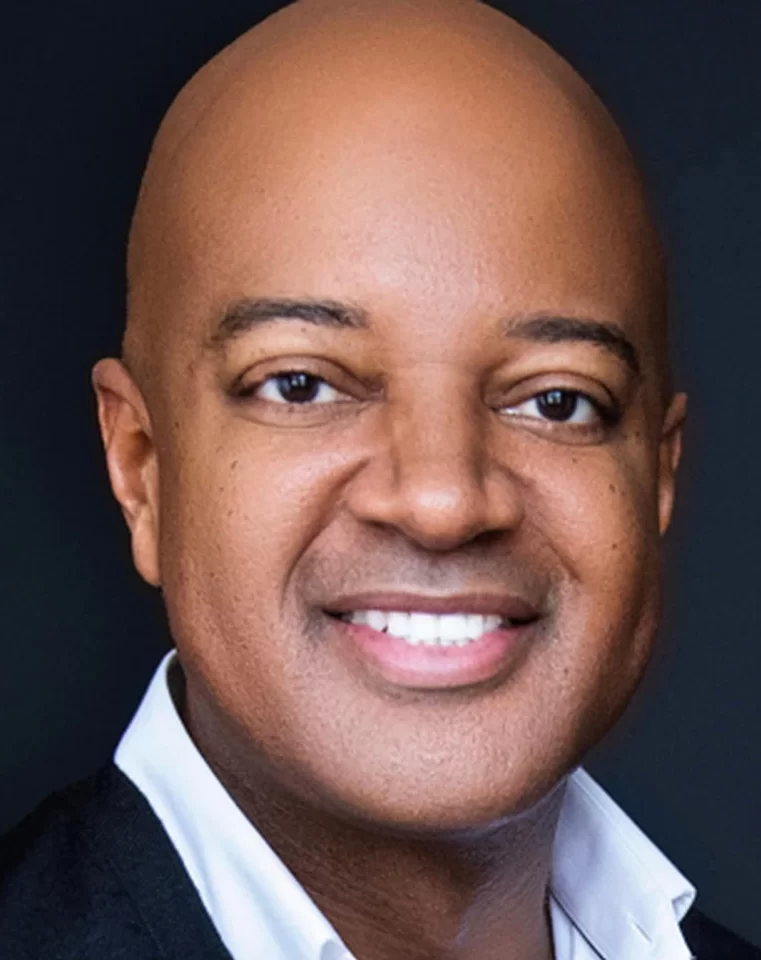 Shipt (pictured), a Black-owned Birmingham-based grocery delivery service, was a major sponsor of the opening reception, with CEO Kamau Witherspoon welcoming the attendees.
Shipt (pictured), a Black-owned Birmingham-based grocery delivery service, was a major sponsor of the opening reception, with CEO Kamau Witherspoon welcoming the attendees.
 Mayor Randall L. Woodfin (pictured), who noted he is a Morehouse College graduate, praised the Black press for publicizing civil rights struggles in his city “when white publications turned a blind eye,” but said his was “not a city that is frozen in the past.” Still, he challenged efforts to downplay or whitewash Black history and said that the role of journalists still should be “telling the stories that will move mountains.”
Mayor Randall L. Woodfin (pictured), who noted he is a Morehouse College graduate, praised the Black press for publicizing civil rights struggles in his city “when white publications turned a blind eye,” but said his was “not a city that is frozen in the past.” Still, he challenged efforts to downplay or whitewash Black history and said that the role of journalists still should be “telling the stories that will move mountains.”
Despite the attention given the NABJ-NAHJ issue, the bulk of the NABJ business meeting was devoted to a discussion of how many members constitute a quorum for business to be conducted.There was no resolution, but the matter is up for a vote as a constitutional amendment to be decided by the end of this year’s convention.
The Washington Association of Black Journalists won “professional chapter of the year” honors, and the student chapter at the University of Missouri was honored as the student counterpart.
- Birmingham Times: Birmingham Native Phyllis Gilchrist Welcomes Journalists to City Where She Co-Founded BABJ
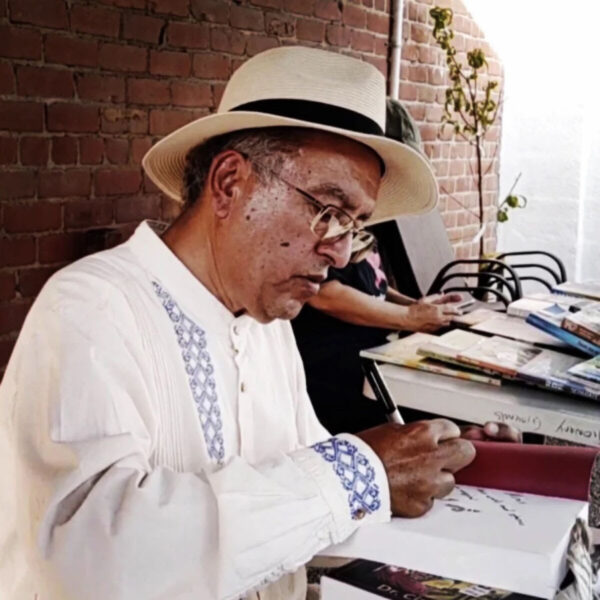
Chicano Author, Journalist Roberto Rodriguez, 69
“In the spring of 1979, Roberto Rodriguez was on assignment for Lowrider Magazine in East Los Angeles,” Gustavo Arellano wrote Tuesday for the Los Angeles Times. “The film ‘Boulevard Nights,’ which dramatized the life of Chicano gangs in the neighborhood, had just debuted, and law enforcement officials across Southern California were arresting people for simply cruising in their barrios.
“On Whittier Boulevard, where Rodriguez had gone to interview and photograph people, he saw L.A. County sheriff’s deputies beating up a man who had wandered onto the street waving a serape. Rodriguez documented the assault, until the deputies demanded he leave.
“ ‘Next thing you know,’ Rodriguez wrote in his subsequent article, ‘I got pushed from behind and then I heard [a deputy] say, “Get against the f— car.” ‘
“Four deputies kicked, punched and beat Rodriguez with a baton before arresting him. He spent three days in the hospital, got 14 stitches for a gash between his eyebrows, then found out that charges would be filed against him for allegedly assaulting the deputies with his camera.
“ ‘The sad part is … things like this happen every weekend — like it was nothing,’ Rodriguez concluded.
“Rodriguez went on to become one of the most prolific Chicano writers of his generation. He authored poems, books and a nationally syndicated column with his wife, Patrisia Gonzales, while lecturing nationwide on everything from police brutality to ethnic studies, Aztec teachings and contemporary politics.
“He died Monday of heart failure in Mexico, where he had lived near Teotihuacan for the past three years while working on his next project and continuing to write his own bimonthly column. He was 69. . . .
“Prosecutors eventually dropped the charges against Rodriguez, but he still sued, alleging that the deputies had violated his 1st Amendment rights and civil rights. In 1986, a jury awarded him $205,000. He used the money to start a bilingual magazine, telling LA Weekly the following year that ‘it would’ve been like drinking my own blood’ to use the money just on himself. ‘And that victory represents a lot of blood,’ he added. . . .”
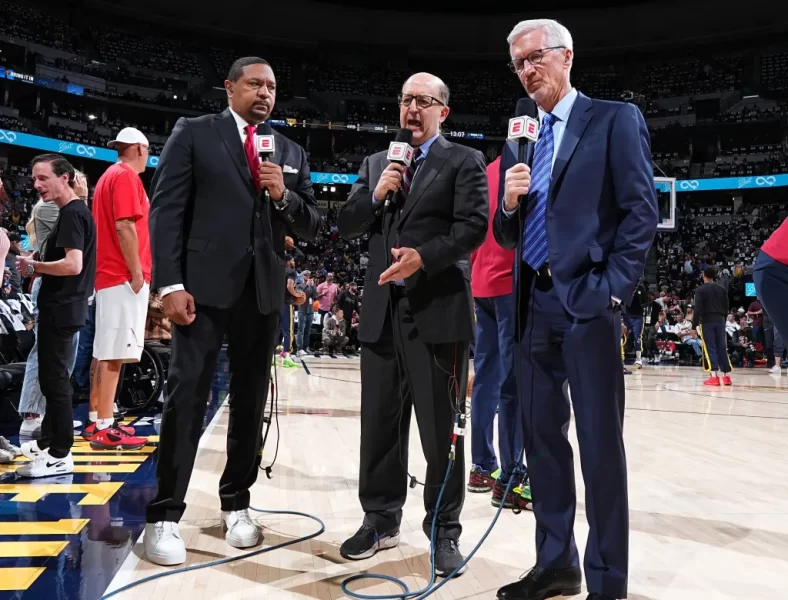
Mark Jackson Laid Off at ESPN
“Add Mark Jackson to the list of ESPN reporters and commentators who have been laid off over the past five weeks,“ Joe Reedy reported Tuesday for the Associated Press.
“Jackson was let go on Monday with two years remaining on his contract. With Jeff Van Gundy also being laid off in late June, ESPN is expected to replace them with Doris Burke and Doc Rivers, two people close to the move told The Associated Press.
“They spoke to the AP on condition of anonymity because they aren’t at liberty to publicly discuss personnel moves.
“Burke and Rivers would join Mike Breen on ESPN and ABC’s top NBA broadcast crew.
“Burke would be the first woman to serve as a game analyst for the NBA Finals on television. She has called the finals on ESPN Radio since 2020 and has been an analyst on ESPN’s NBA games since 2017. . . .”
To subscribe at no cost, please send an email to journal-isms+subscribe@groups.io and say who you are.
Facebook users: “Like” “Richard Prince’s Journal-isms” on Facebook.
Follow Richard Prince on Twitter @princeeditor
Richard Prince’s Journal-isms originates from Washington. It began in print before most of us knew what the internet was, and it would like to be referred to as a “column.” Any views expressed in the column are those of the person or organization quoted and not those of any other entity. Send tips, comments and concerns to Richard Prince at journal-isms+owner@
View previous columns (after Feb. 13, 2016).
View previous columns (before Feb. 13, 2016)
- Diversity’s Greatest Hits, 2018 (Jan. 4, 2019)
- Book Notes: Is Taking a Knee Really All That? (Dec. 20, 2018)
- Book Notes: Challenging ’45’ and Proudly Telling the Story (Dec. 18, 2018)
- Book Notes: Get Down With the Legends! (Dec. 11, 2018)
- Journalist Richard Prince w/Joe Madison (Sirius XM, April 18, 2018) (podcast)
- Richard Prince (journalist) (Wikipedia entry)
- February 2018 Podcast: Richard “Dick” Prince on the need for newsroom diversity (Gabriel Greschler, Student Press Law Center, Feb. 26, 2018)
- Diversity’s Greatest Hits, 2017 — Where Will They Take Us in the Year Ahead?
- Book Notes: Best Sellers, Uncovered Treasures, Overlooked History (Dec. 19, 2017)
- An advocate for diversity in the media is still pressing for representation, (Courtland Milloy, Washington Post, Nov. 28, 2017)
- Morgan Global Journalism Review: Journal-isms Journeys On (Aug. 31, 2017)
- Diversity’s Greatest Hits, 2016
- Book Notes: 16 Writers Dish About ‘Chelle,’ the First Lady
- Book Notes: From Coretta to Barack, and in Search of the Godfather
- Journal-isms’ Richard Prince Wants Your Ideas (FishbowlDC, Feb. 26, 2016)
- “JOURNAL-ISMS” IS LATEST TO BEAR BRUNT OF INDUSTRY’S ECONOMIC WOES (Feb. 19, 2016)
- Richard Prince with Charlayne Hunter-Gault, “PBS NewsHour,” “What stagnant diversity means for America’s newsrooms” (Dec. 15, 2015)
- Book Notes: Journalists Follow Their Passions
- Book Notes: Journalists Who Rocked Their World
- Book Notes: Hands Up! Read This!
- Book Notes: New Cosby Bio Looks Like a Best-Seller
- Journo-diversity advocate turns attention to Ezra Klein project (Erik Wemple, Washington Post, March 5, 2014)

